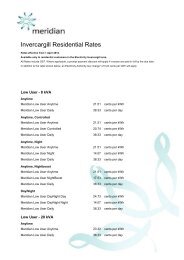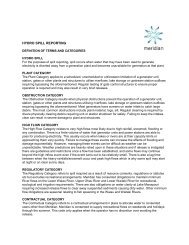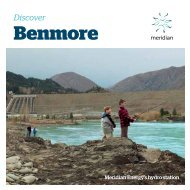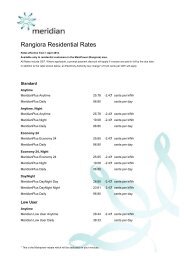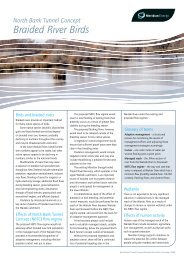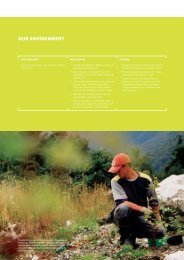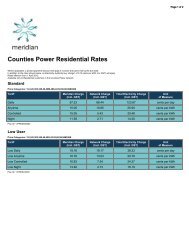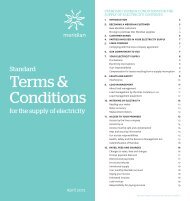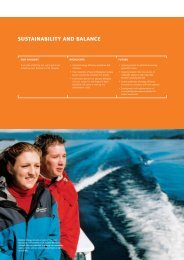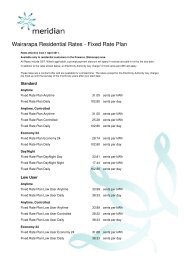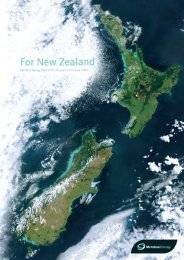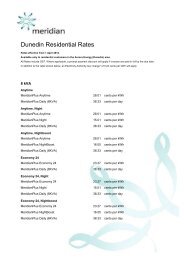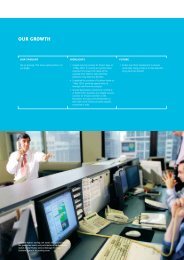Meridian Annual Report - Meridian Energy
Meridian Annual Report - Meridian Energy
Meridian Annual Report - Meridian Energy
You also want an ePaper? Increase the reach of your titles
YUMPU automatically turns print PDFs into web optimized ePapers that Google loves.
83<<br />
<strong>Meridian</strong> <strong>Energy</strong> Limited — Notes to the Financial Statements (continued)<br />
To the extent that hedge accounting does not apply, there is potential for profit volatility resulting from the application of NZ IFRS.<br />
The key impact of this change in accounting principle is to recognise fair value of financial instruments on the balance sheet classified accordingly as<br />
assets or liabilities.<br />
d) Deferred Tax<br />
Under previous NZ GAAP income tax expense was calculated based on pre-tax accounting profits after adjustment for permanent differences. The tax<br />
effect of timing differences, which occur when items were included or allowed for income tax purposes in a period different to that for accounting were<br />
recognised at current taxation rates as deferred tax assets and deferred tax liabilities, as applicable.<br />
Under NZ IAS 12: Income Taxes, deferred tax is determined using the balance sheet liability method in respect of temporary differences arising from<br />
differences between the carrying amount of assets and liabilities in the financial statements and their corresponding tax bases.<br />
The key impact of the balance sheet approach is the recording of an additional deferred tax liability on the fair value adjustments made in respect of<br />
property, plant and equipment, financial instruments and intangibles carried at fair value.<br />
e) Borrowings<br />
Under previous NZ GAAP borrowings were stated at face value less unamortised discounts, premiums and prepaid interest. Costs directly attributable<br />
to the issuance of debt were recorded as a prepaid asset and written off over the life of the related debt. Under NZ IFRS borrowings are recognised<br />
initially at fair value, net of transaction costs. Borrowings not designated as hedged items are subsequently stated at amortised cost. Borrowings<br />
designated as hedged items are stated including the gain or loss attributable to the hedged risk in accordance with NZ IAS 39: Financial Instruments.<br />
The key impact of this change in accounting principle is to recognise borrowings including the gain or loss attributed to the hedged risk on the balance<br />
sheet net of transaction costs.<br />
f) Intangibles<br />
NZ IAS 38: Intangible Assets requires computer software to be classified as an intangible asset when the software is not an integral part of the related<br />
hardware. Under previous NZ GAAP <strong>Meridian</strong> classified software as equipment. The key impact of this change in accounting principle is to reclassify<br />
software as an intangible asset.<br />
In accordance with previous NZ GAAP goodwill is amortised on a straight-line basis over the period of expected benefit. Under NZ IFRS goodwill is no<br />
longer amortised but tested for impairment at least annually or when indication of impairment exists.<br />
The key impact of this change in accounting principle is to reverse previous amortisation and increase the carrying amount of goodwill.<br />
g) Interest Income<br />
Under previous NZ GAAP interest income was reported as part of operating revenue. Under NZIFRS, interest income has been reclassified from<br />
operating revenue to net financing costs.<br />
h) Gain/(Loss) on Sale of Property, Plant and Equipment<br />
Under previous NZ GAAP gains and losses on sale of property, plant and equipment were reported as part of operating revenue and operating expenses<br />
respectively. Under NZIFRS, these have been reclassified to be reported separately as net gain/(loss) on sale of property, plant and equipment.<br />
i) Miscellaneous Charges<br />
Under previous GAAP, some charges were offset against operating income and reported as part of operating income. This treatment has been<br />
reconsidered under NZ IFRS and these charges are now reported as operating expense.



